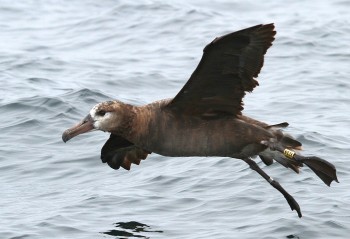Rowan Mott and Rohan Clarke (School of Biological Sciences, Monash University, Clayton, Australia) have published in the journal Emu - Austral Ornithology on geographic biases with studying seabirds at sea.
The paper’s abstract follows:
“The distribution of wildlife informs conservation planning. In marine systems, spatial information for seabirds is acquired primarily using vessel-based at-sea survey, aerial survey or animal-borne tracking devices. Many factors contribute to geographic biases in marine spatial research and we use a structured database search to review global patterns resulting from these biases. Although survey effort has been substantial, many large marine sectors were poorly represented. Poor representation often coincided spatially with hotspots of seabird species richness or areas experiencing high cumulative human impact, particularly in southern hemisphere and equatorial regions. Therefore, future seabird research priorities should reflect high species-richness areas including the south-west Pacific, particularly waters surrounding New Zealand. Furthermore, under-represented areas of Asia, and the Atlantic coasts of South America and Africa require greater research effort because of high cumulative human impacts in these areas. National gross domestic product (GDP) was positively related to the number of papers a country produced (determined by the first author’s address). This is indicative of constraints imposed by inherent costs of marine research. We recommend international collaboration between scientists from high-GDP nations with those in developing countries to address this. Further uptake of platforms of opportunity may also reduce this imbalance.”

A Black-footed Albatross Phoebastria nigripes at sea in the North Pacific, photograph by Vicki Miller
Reference:
Mott, R. & Clarke, R.H. 2018. Systematic review of geographic biases in the collection of at-sea distribution data for seabirds. Emu - Austral Ornithology. DOI:10.1080/01584197.2017.1416957.
John Cooper, ACAP Information Officer, 01 February 2018

 English
English  Français
Français  Español
Español